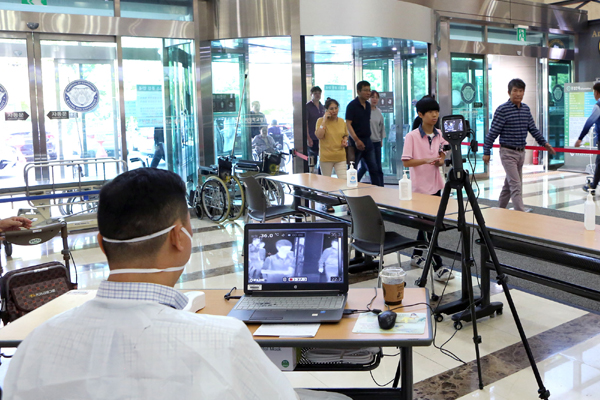Korean hospitals have entered into a high alert mode as the authorities recently confirmed the first case of the Middle East Respiratory Syndrome (MERS) in three years.
The hospitals’ swift responses and tight control of visitors were in stark contrast to the situation in 2015 when the country suffered a widespread of the infectious disease.
The National Medical Center set up a “MERS emergency response task force” under the leadership of NMC head Chung Ki-hyun and held an urgent meeting to discuss MERS-preventing measures.
The state-run hospital installed a negative pressure tent to use it as a separate examination room and dispatched physicians to the tent. The NMC operates a state-designated isolation ward and a negative pressure ward within the emergency room. The hospital treated 30 MERS patients without additional infection during the 2015 outbreak.

Kyung Hee University Hospital at Gangdong also issued an emergency alert. The hospital has been controlling access to the hospital since Sunday. The hospital unified all entrances to the central one and installed infrared heat cameras to check visitors’ fever. If the hospital finds a patient with fever, it checks the patient with a non-contact thermometer.
The hospital is also investigating the epidemiological relationship with visitors through flyers, asking any of them had visited the Middle East, or the Incheon International Airport since Sept. 7, or who had fever or problems in the respiratory/digestive system.
Kyung Hee University Hospital at Gangdong said it would restrict a suspected MERS patient from entering the hospital and move the person to the ER’s isolated examination room.
To prevent employees from infection, security guards at entrance wear full-body protection gear, a goggle, an N95 mask, and gloves. Everyone at ER, artificial kidney room, respiratory medicine department for outpatient treatment, and internal medicine department should wear masks.
The hospital plans to maintain the entrance control and screening on visitors until Sept. 27.
“Our hospital has been more thoroughly prepared, based on our experience of overcoming the MERS outbreak in 2015,” said Kim Ki-taek, chief of the hospital. “At present, the infection has not spread, and some may think that our response is a little excessive. As we put the safety of the patients as the top priority, however, we will act more actively and thoroughly according to our manual.”
Other hospitals have canceled healthcare lectures to minimize people’s gatherings.
Ewha Womans University Medical Center on Monday called off all lectures on health indefinitely. In celebration of the eighth anniversary of the hospital’s Stomach/Colorectal Cancer Center, the hospital had planned to offer a lecture on healthy stomachs and large intestines on Wednesday, and on chronic kidney diseases on Thursday next week.
To brace for a visit by a suspected MERS patient, the hospital installed a negative pressure tent with physicians exclusively working under the tent.
Konkuk University Medical Center also delayed holding lectures on breast cancer and colon cancer, initially planned for Tuesday and Friday.
According to the Korea Centers for Disease Control and Prevention (KCDC), 21 people had close contact with the MERS patient and 417, daily contact. Among the people who had contact with the patient, four were suspected of infection with the contagious disease, but all of them tested negative in a preliminary examination. The four are waiting for a second test.
Health center officials are monitoring people who had close contact with the MERS patient. Provincial government officials are also actively monitoring the people who had daily contact with the patient.

